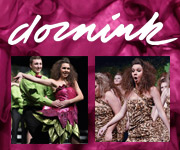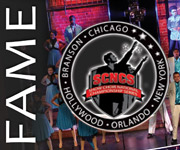
These lyrics are a major part of my childhood and are happily ingrained in me, ever since my mother took me to see the musical performing group Up With People in the ’70s. The words are so uplifting, positive, and truthful. I’m sure I wore out the vinyl LP singing and dancing along at home. No wonder I got into choir in eighth grade and then show choir in high school!
What a surprise it was while talking with Dr. Patrick McCormick to learn that his mother had been a cast member. McCormick, choral director at Prattville High School in Prattville, Alabama, spoke with me about becoming a show choir director and about the reasons he founded the National Association for Show Choir (NASC) dedicated to music educators.
Gibbs: I’m a curious person and I enjoy hearing from people how they came to be doing work they truly love. How did you get into show choir?
McCormick: Looking back at my mother’s life, she was in Up With People, which was kind of the first well-known show choir.
Gibbs: Oh my gosh, my mom took me to see them and I said, ‘I want to do that!’
McCormick: Yes! My journey really began with her love of music, learning of her experiences with that group. My first time in choir was seventh grade, then as a freshman in high school I was in the show choir, which was more like a ‘swing choir’ than a show choir. We would perform at the Kiwanis Club, Lions Club, do singing Valentines, stuff like that. We wore the same outfit to everything. Looking back, it’s nothing like I know of now.
Gibbs: It certainly has evolved. You founded a group named National Association for Show Choir (NASC). How did NASC come about as something that you feel could be of service to the field?
McCormick: I’ve been going to Showchoir Camps of America (SCA) the past few years, and in 2023, I began to wonder—what would it look like if we had some sort of formal organization that could connect us, and what if we met on a more regular basis, more than once a year? I noticed a lot of the directors are getting older and it seems like there’s not a whole lot of younger students coming out of undergrad wanting to be a show choir director, or maybe they simply don’t know how to be a show choir director.
Gibbs: According to the organization’s Facebook page, “the mission of NASC is to advocate, educate, and inspire current and future music educators for the purpose of progressing show choir throughout the United States.” Why those particular activities—advocate, educate, and inspire?
McCormick: When I came to Prattville, no one really knew what we were doing at the school regarding show choir. I’ve had to advocate and advocate for this program. Finally just now, I don’t know if [it’s] because we made Show Choir Nationals, or because I am consistently advocating, [but] people are coming around to support us. It takes a lot of time to advocate for your program, if it’s not already established. It’s huge when communities can get behind a show choir.
The mission to educate is because I feel like there are a lot of misconceptions about show choir. I think everyone thinks you come out of the gate and you have to be a big program, like an Oak Mountain or Homewood High School (larger high schools near Prattville). I think that scares a lot of people. At least that’s what I’ve heard from colleagues.
Also, I think we also have to inspire that next generation. A lot of my mentors are starting to retire. They are in their 50s and 60s and have been directing for 25 or so years. The 20 year olds coming out of undergraduate, they may just not know. The idea is to inspire them, encourage them, let them know it’s possible. Show choir is attainable.
It’s going to take a lot of work. I would like to travel to schools that don’t have show choir and be the outsider coming in to talk to the administration, be a bridge. The music educator in the school may have a want but is scared to go to their administrators and ask to start a show choir program. I can talk with them about how I did it. When I was teaching in Florence, Alabama, my sixth grade show choir started with nothing. We built sets and learned choreography. We took a bus to watch Nationals in Nashville. Even if it’s something as simple as that, the kids get involved and invested.
Gibbs: Do you think one of the things that holds people back is there are more resources that go into a show choir production versus a choir where you can have one outfit and one piano player?
McCormick: For sure.
Gibbs: Where are they going to get the money?
McCormick: That’s another thing I can talk about. My group now with the band is 20 students. The school gives us nothing. We raised over $42,000. I pick fundraisers worth our time. It can be done.
It’s a matter of understanding you are not alone. That’s what NASC is all about. Connecting people. I want you to be able to reach out to someone who knows someone who can get you connected to what you need. I want it geared to music educators who are asking “how do I” with show choir. In the end I want us connected and know we can lean on each other.
I want it to start at the local and state level, then become a regional and national organization. I really like the template that the American Choral Directors Association (ACDA) has, so I used that model for how to structure the groups. ACDA started with around 35 people who met and decided to create ACDA and now it’s an international organization.
I had no idea how to be a show choir director until I worked in Albertville, Alabama. For a year I struggled with the idea of show choir, figuring out how to produce good sound and dance at the same time. Some of that is because of my training as an opera singer.
Gibbs: Is there a degree program in show choir?
McCormick: No. For my dissertation, I interviewed 10 directors from across the U.S. to get a consensus on whether or not show choir incorporates choral fundamentals in what they do. James Madison University was the only institution that was mentioned during interviews to have a show choir methods course (MUED 471: School Musical, Jazz and Show Choir Procedures). Since becoming director of choral activities at my school, I’ve had to be an accountant, learn the ins and outs of getting costumes and arrangements, and be a mentor to my students. I had to learn to run a soundboard for my group. I would have loved to have taken a lighting course, but if you don’t know that you are going into this field, you don’t know to take that course.
There’s a lot of things we can change. On a higher education level it may take an increase in show choir in schools before a degree program would be in demand. That could happen.
Gibbs: It does take time to develop a program, unless it’s already well established.
McCormick: And a problem with that is directors who leave after only a few years. The kids don’t have consistency. I plan to be here at Prattville and grow this program. Ninth through 12th graders are my mission field.
Gibbs: What is it about show choir that students get out of participating versus regular choir?
McCormick: Show choir allows students to break out of their shell, do something they may not have imagined they could do. It’s the confidence that they gain. It’s a journey. To see my group at the beginning of the year and to see them now, it’s a night and day difference. You see them pick up confidence along the way. It allows the students to tap into so many different elements. It allows them to grow in all facets of the fine arts. I hope my seniors will be better adults as they go into undergrad.
On a personal level, creating a show and watching it come to life is a beautiful thing to see, as a teacher and creative minded person. You don’t always know how the show will turn out, lights, etc. but to see it come together is beautiful.
I love what I do. I want others to love it too. We are trying to achieve the same goal with our students—to inspire them to be better, give them confidence, and find themselves. The emotions I encounter every day, especially post pandemic, the students need something to tap into. I think show choir gives them the opportunity to do that. Every school should have show choir.
Gibbs: Advocate, educate, and inspire—“If more people were for people, all people ev’rywhere, there’d be a lot less people to worry about and a lot more people who care.”
Thank you, Dr. McCormick!
Search National Association for Show Choir on Facebook to learn more.











